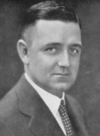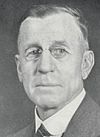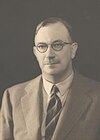Fadden Ministry
| Fadden Ministry | |
|---|---|
28th Ministry of Australia | |
| Date formed | 28 August 1941 |
| Date dissolved | 7 October 1941 |
| People and organisations | |
| Monarch | George VI |
| Governor-General | Lord Gowrie |
| Prime Minister | Arthur Fadden |
| No. of ministers | 19 |
| Member party | Country–United Australia coalition |
| Status in legislature | Minority government |
| Opposition party | Labor |
| Opposition leader | John Curtin |
| History | |
| Legislature term(s) | 16th |
| Predecessor | Third Menzies Ministry |
| Successor | First Curtin Ministry |
The Fadden Ministry (Country–United Australia Coalition) was the 28th ministry of the Government of Australia. It was led by the country's 13th Prime Minister, Arthur Fadden. The Fadden Ministry succeeded the Third Menzies Ministry, which dissolved on 28 August 1941 following the resignation of Robert Menzies as Prime Minister. A subsequent joint meeting of the Coalition parties elected Country leader Fadden as Menzies' successor. The ministry was replaced by the First Curtin Ministry on 7 October 1941 after the independent crossbenchers Alexander Wilson and Arthur Coles withdrew their support for the Fadden Government and voted with John Curtin and his Labor Party to bring the government down in a de facto no-confidence motion.[1]
Percy Spender, who died in 1985, was the last surviving member of the Fadden Ministry; Spender was also the last surviving minister of the first Menzies Government and the Fourth Menzies Ministry. John McEwen was the last surviving Country minister.
Ministry[]
| Party | Minister | Portrait | Portfolio | |
|---|---|---|---|---|
| Country | Hon Arthur Fadden (1894–1973) MP for Darling Downs |

|
| |
| United Australia | Rt Hon Robert Menzies KC (1894–1978) MP for Kooyong |

|
||
| United Australia | Rt Hon Billy Hughes CH KC (1862–1952) MP for North Sydney |

|
| |
| United Australia | Hon Percy Spender KC (1897–1985) MP for Warringah |

|
| |
| United Australia | Hon George McLeay (1892–1955) Senator for South Australia |

|
||
| Country | Hon John McEwen (1900–1980) MP for Indi |

|
| |
| United Australia | Hon Harry Foll (1890–1977) Senator for Queensland |

|
| |
| Country | Rt Hon Sir Earle Page GCMG (1880–1961) MP for Cowper |

|
| |
| United Australia | Hon Sir Frederick Stewart (1884–1961) MP for Parramatta |

|
| |
| United Australia | Hon Philip McBride (1892–1982) Senator for South Australia |

|
||
| United Australia | Hon Eric Harrison (1892–1974) MP for Wentworth |

|
| |
| United Australia | Hon Harold Holt (1908–1967) MP for Fawkner |

|
| |
| United Australia | Hon Herbert Collett CMG DSO VD (1877–1947) Senator for Western Australia |

|
||
| Country | Hon Thomas Collins (1884–1945) MP for Hume |

|
| |
| United Australia | Hon John Leckie (1872–1947) |

|
| |
| Country | Hon Larry Anthony (1897–1957) MP for Richmond |

|
| |
| United Australia | Hon Eric Spooner (1891–1952) MP for Robertson |

|
||
| Country | Hon Joe Abbott MC (1891–1965) MP for New England |

|
||
| United Australia | Hon Allan McDonald (1888–1953) MP for Corangamite |

|
| |
Notes[]
- ^ "Ministries and Cabinets". Parliamentary Handbook. Parliament of Australia. Archived from the original on 8 October 2012. Retrieved 17 September 2010.
- Australian Commonwealth ministries
- 1941 establishments in Australia
- 1941 disestablishments in Australia
- Cabinets established in 1941
- Cabinets disestablished in 1941
